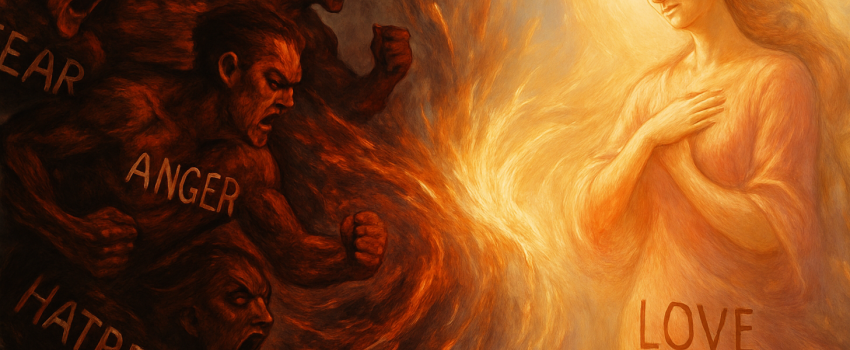
Regardless of one’s political leanings, Charlie Kirk’s murder was a despicable, heartbreaking act. It triggered powerful emotions of Fear, Guilt, Anger, and Hatred, along with the usual finger‑pointing at “the other side.” That reflex, along with inflammatory rhetoric, will only perpetuate the very behavior we find so abhorrent.
The Root Cause
Before we argue about policy or blame, ask the most important question: What was the emotional state of the shooter? That question is not a distraction; it is the key. All human behavior is emotionally driven. If we understand the mechanism of Thought → Emotion → Behavior, we can interrupt it, restructure it, and reprogram it.
You cannot tell people how to feel, what to do, or what to say. How well has “calm down” ever worked? How effective is “stop the violent rhetoric?” The only durable answer is independent thinking. And to think independently, one must understand the mechanism.
The Mechanism, Briefly
- Thought: The internal narrative, beliefs, and interpretations you allow to run your mind.
- Emotion: The state that follows those thoughts, fear, guilt, anger, hatred, or love.
- Behavior: The outward action that inevitably follows the emotional state.
Because behavior follows emotion and emotion follows thought, the leverage point is thought. Teach people to examine and choose their thoughts, and you change their emotions and behaviors.
Data and Early Intervention
This isn’t abstract. With the right data infrastructure, patterns of escalating risk can be flagged, especially in academic, corporate, or military settings where data collection is feasible. AI can help surface potential problems far earlier. But tools only help if we first teach people the mechanism so they can self‑correct.
The Solution: Start From the Beginning
I can’t lay out the entire process here, but the beginning of independent thought should start around age three or four, once a child has enough language.
A Practical Example
Years ago, my executive assistant struggled with her four‑year‑old son's behavior. I told her to teach him the meaning of results, that everything he does produces a result. Lay out the result certain behaviors will produce. For instance, no playing with his favorite toys or no Gameboy for a short period of time. This addresses several issues:
- It initiates self-control over his emotional state
- It programs him to question the result of everything he does, not just the scenarios you define.
- It eliminates the need for reprimands or spankings.
- It fosters critical, independent thinking, making him far less vulnerable to outside influence.
As four‑year‑olds do, he tested it. When he pushed past the boundary, his mother didn’t scold or reprimand. She asked, “What result did you just produce?” When he realized he was responsible for what was about to happen, the look on his face was surprise and shock. She only had to ask that question once. I know for some people putting the responsibility of a 4-year-old's behavior on the 4-year-old may seem ridiculous, but you do not stop watching them like a hawk; you are simply causing them to think.
Adult Accountability
Do you think the shooter was programmed to ask, “What will be the result of this action?” Highly unlikely. Acts like this are driven by aberrant emotion with unexamined thoughts at the wheel. We will never control the garbage that is churning around in someone's head or what comes out of someone else’s mouth. But we can teach our children to think independently so they are not influenced by it in a destructive way.
This question is just as necessary for adults. People are being fired from their jobs for praising the murder of Charlie, not only because their words were inappropriate, but because they failed to think independently and assert control over their emotional state and behavior. The question stands: “What will be the result of this action?” I am certain that the MDs, teachers, and other well-educated people who lost their jobs did not ask the question, “What will the results of me stating this opinion be?”
The Missing Emotional State
When you are in Fear, Guilt, Anger, or Hatred, what’s missing? What is missing is your most powerful emotional state, and this is the emotional state of love. I’m not talking about being “in love,” but the state itself. Love is absolute power. It is the only emotional state powerful enough to interrupt the cycle, recalibrate thought, and redirect behavior, but one must understand the mechanism of this process. Anytime one allows the state of fear, guilt, anger, or hatred to take hold, you have just thrown away your most powerful state.
Closing Thought
If we want fewer tragedies, we must build independent critical thinkers early. Teach the mechanism. Teach accountability through results. Use emotional and gut health data to flag risk. And above all, cultivate the emotional state that makes independent thought possible. Start there, and everything else has the opportunity to change.
About Kelly Burris, PhD, MSRT
Kelly Burris has defined 'Normal' in an industry, which only defines broken or disordered. He is the developer of the empirically sound mind-gut-brain Subconscious Restructuring® (SR™) process and founder of Burris Institute. With over 300 medical references, SR™ represents a scientific breakthrough in mental health, and it has done this without meds, labels, or personal history.
As part of the Burris ecosystem, SR™ Practitioners can manage, track, and interact with current and future clients after certification on BurrisConnect.com. This same ecosystem enables corporate, military, and educational entities to supervise and monitor the performance of their internal SR™ (mental health) infrastructure in the cloud.
